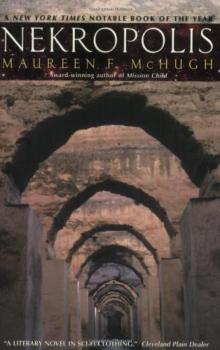Read Nekropolis Storyline:
Amazon.com ReviewHariba, a poor young Near Eastern woman, sells herself into a slavery guaranteed by "jessing," a biochemical process that makes her permanently loyal to her owner. She would be content, if not happy, in her new house-servant's life--if her mistress didn't own a harni. A harni is a chimera, a genetically engineered man who may or may not be human, but who is stunningly handsome and who treats Hariba with a gentle, attentive consideration she has never before experienced. The chimera, Akhmim, is so unlike Hariba's expectations that her fear and hatred give way to love and, impossibly, to dissatisfaction with her scientifically cemented loyalty. Hariba and Akhmin flee to the Nekropolis, the Moroccan cemetery/ghetto in which she grew up. But her family and best friend are unhappy to see her and horrified by the chimera, and running away from her bonded master precipitates a serious, potentially fatal illness. Her family and friends are too poor and too afraid of arrest to hire a physician. And the unfailingly patient and considerate chimera begins to have strange effects on the women in Hariba's life.Like Maureen F. McHugh's previous novels, Nekropolis is beautifully written, thoughtful, and powerful, with complex, sensitively delineated, always believable characters. McHugh portrays human behavior with a rare and sometimes heartbreaking honesty and with an exceptional insight into the interplay of male-female relationships and the dilemma of the stranger in a strange land. Like McHugh's debut novel, __ (winner of the Hugo, Tiptree, Lambda, and Locus awards), the chapters are narrated in alternating first-person viewpoints that offer fresh and contrasting angles and understanding of the characters and their world. --Cynthia WardFrom Publishers WeeklyIn this exquisite if melancholy novel, McHugh (Mission Child) evokes a repressive, intensely sexist 22nd century Morocco that is largely cut off from the rest of the world by the dictates of the Second Koran. Hariba, a young servant woman, has grown up in the Nekropolis, an ancient burial ground that also serves as home to the city of Fez's teeming poor. Unsuccessful in love, she chooses to be "jessed," undergoing a medical procedure designed to turn her into the perfect servant, one who is psychologically incapable of being disloyal to her employer. Unfortunately, however, Hariba soon runs afoul of her employer's wife, a restless shrew of a woman who devotes most of her time to bismek, a convoluted form of participatory virtual-reality soap opera. Worse still, Hariba, who's terribly lonely, falls in love with Akhmim, a harni or artificial person, who looks human, but isn't. Akhmim "impresses" on Hariba, returning her feelings as best he can. Indentured to another employer, she misses Akhmim terribly and eventually runs away with him. Alternating between four narrators Hariba, Akhmim, Hariba's mother and Hariba's best friend, Ayesha McHugh centers her novel on a well-realized set of sympathetic, but imperfect characters. Each speaks with a distinct voice, describing a complex and not entirely healthy web of friendships and familial relationships. McHugh's Morocco, with its intensely symbolic Nekropolis, is very real, but ultimately it is Hariba, Akhmim and their heartbreaking, impossible relationship that the reader will remember. Agent, Sandra Dijkstra. Copyright 2001 Cahners Business Information, Inc.Pages of Nekropolis :
